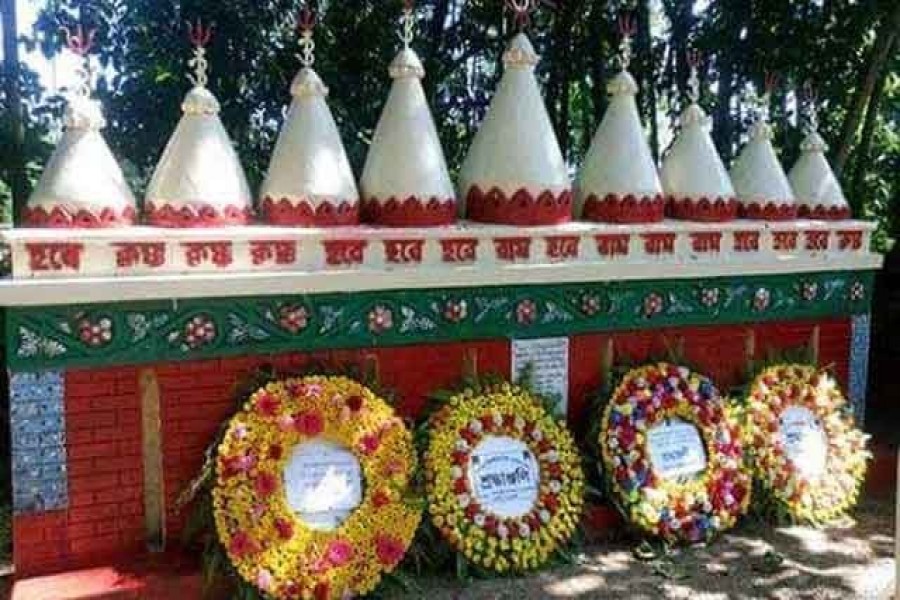Bimal Sheel, the lone survivor of an arson attack that left his home burnt and 11 members of the family dead, is waiting for justice nearly two decades after the carnage in Chattogram’s Banshkhali.
“I hoped I would get justice, but I haven’t got it yet,” said a frustrated Bimol on Thursday, the 18th anniversary of the massacre, as he continues to meet lawyers and officials relentlessly.
A veteran lawyer and general secretary of the Hindu Buddhist Christian Unity Council, Rana Dasgupta, described the delay in ending the Banshkhali trial as an example of a “culture of impunity that led to” repeated attacks on the religious minorities of Bangladesh, reports bdnews24.com.
And 28 months have passed since the High Court ordered the disposal of the case within six months from Jun 23, 2019, but the trial court is yet to record testimonies of more than half of the 50 witnesses.
No witness testified in 2021 after the statement of the 22nd was recorded last year. Bimal said he had thought the trial would end if the depositions of more than 25 witnesses were recorded.
“The situation has come to such a point that no witness is agreeing to testify. Warrants are required for their presence. Even the then OC of Banshkhali Police Station and the ASP (assistant superintendent of police) who investigated the case have not testified,” said Bimal.
He urged the state lawyers to come forward and finish the recording of witnesses’ statements.
The perpetrators set fire to the house at Sheelpara in Sadhonpur village by using gun powder on the night of Nov 18, 2003, burning to death 11 people, including women and children.
The victims are Tejendra Lal Sheel, 70, his wife Bakul Sheel, 60, their son Anil Sheel, 40, Anil’s wife Smriti Sheel, 32, Anil and Smriti’s three children Rumi Sheel, 12, Sonia Sheel, 7, and 4-day-old Kartik Sheel, Tejendra’s nieces Babuti Sheel, Prasadi Sheel, 17, and Annie Sheel, 7, and their relative from Cox’s Bazar Debendra Sheel, 72.
Bimal, another son of Tejendra who survived the carnage, later started a case. Now he fears for his own safety as the authorities removed a police camp from the scene a few years ago.
“Awami League leaders promised me justice and home if they win the election. I’ve got nothing.”
Bimal also faces a financial crisis to run the case. The deputy commissioner of Chattogram is trying to manage a government fund for Bimal to build a house. “I’ve submitted the papers to the Prime Minister’s Office. Let’s see what happens.”
“The justice seekers won’t consider it justice even if the trial ends now. They lost everything in 2003 and continued to suffer to run the case for so many years,” said Rana.
“This (case) shows the situation in which the minorities in Bangladesh live in now.”
“This case shows how the culture of impunity exists in attacks on minorities. Communal forces are encouraged by the delay in the trial.”
THE TRIAL
The court of Chattogram Third Additional District and Session Judge Ferdous Wahid is hearing the case now.
Hla Ching Pru, an assistant superintendent of police, submitted the charge sheet in January 2011. He was the eighth investigation officer assigned to the case.
He brought charges of arson, murder and looting against 38 accused. The state counsel added the charge of murder with an intention to grab property in February 2012, and the court framed the charges in April the same year.
Only two of the accused are behind bars while 17 are on bail and 19 are on the run.
The court began recording statements of the witnesses in May, 2012 and transferred the case to the Speedy Trial Tribunal in October, but it was shifted back to the trial court after the deadline for speedy trial ended without a verdict in 2013.
Additional Public Prosecutor Lokman Hossain Chowdhury said the court set February 22, 2022, to resume the hearing.
The court did not have a judge for months while the coronavirus lockdowns also delayed the trial, he said.
New warrants for witnesses were issued after the old ones could not be implemented because of the shutdowns, according to him.


